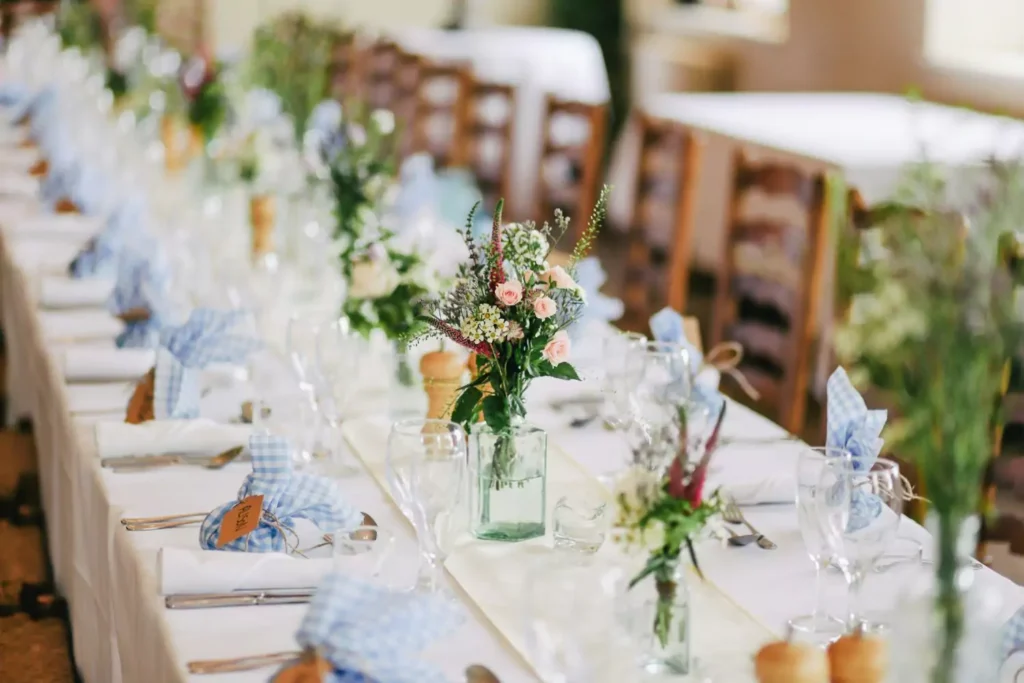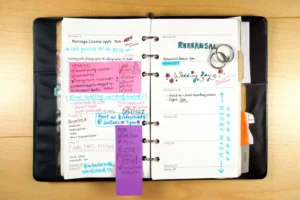The engagement ring sparkles with promise of your beautiful future together, and that first-dance song you chose makes your throat tighten with tears … wait, no, it used to make you choke up. That was before the stress for the wedding day converted your dreamy bliss into a messy ball of stress and panic.
Wedding Planning Is No Picnic
From afar, the idea seems so enticing, so exciting and, for any of us who inherited the event planner gene, so wonderfully challenging, since we’ll be orchestrating our very own celebration.
But the truth is most brides, myself included, were crestfallen when we realized how hard planning a wedding turned out to be.
I hadn’t expected my family and my future husband’s family to have such different opinions about how things should go. For example, my parents enjoy a good glass of wine in moderation; his parents don’t believe in drinking on any occasion.
I’d never imagined that food, reception space and a wedding dress could be so hard on our budget, nor was I prepared for the damage that the event coordinating would wreak on my own mental sanity and peace.
The following are bits of wisdom that I gleaned while planning my own wedding:
1. Balance the Budget
The amount of money at your disposal will largely affect your plans. My parents told me the total they could contribute, and whatever James and I didn’t use on the wedding, we could put toward a down payment on a new house. This motivated me.
I bought my dress at an outlet store. I asked my cousin, who’d attended culinary school, if she’d cater my wedding. I chose a morning wedding timeslot so that I could serve lunch at my reception instead of a more expensive dinner.
The thing to focus on here is not throwing scads of cash at one day to achieve “perfection,” but choosing two or three components that are important to you, then letting the other details fall as they will.
So, if your three priorities are fancy invitations, photography and your aunt’s homemade tarts for the reception, focus on these and allocate the proper funds, but don’t then insist that the reception table centerpieces also must look like something Martha Stewart would make.
Budgeting for a few items will let you focus on the things most important to you, which gives you a sense of accomplishment and success.
2. Expect Some Family Drama
Whether it’s your mother-in-law suggesting that you have your dance at the end of the reception so those potentially offended can make an early exit, or your relatives from Europe asking every three days if you’ve chosen your date so that they can book their international flight tickets, family members often complicate wedding planning.
I realized, with some irony, that my reception was a way to thank friends and family for loving and supporting me throughout my life much more than it was about my personal party.
This breakthrough helped me relinquish control. As I listened to my mother, grandmother and mother-in-law-to-be, I tried my best to find solutions that, though they wouldn’t please everyone, would at least find good common ground.
I maintained the tone I wanted for our wedding (a fun tropical-adventure theme, in our case) but gave respect and deference for things such as the reception arrangement and how my husband’s parents would participate in the ceremony.
Learning to blend two families is a skill in which you will constantly have to grow, trust me! Now is a great time to start. This goes back to what I said about choosing three things that are important to you and being flexible with the rest. You’ll be asked by your family to bend all kinds of details, and you’ll be glad you planned to be ready for it.
3. Delegate Organization
If you’ve worked in any sort of project management capacity, the idea of delegating tasks to others won’t surprise you. You might have the funds to hire a wedding coordinator, or you might have a volunteer to run things, but however you decide to manage all the moving pieces, here’s a secret: You will not be able to oversee every detail of your wedding.
Often, you’ll not be able to do more than glance at the reception hall set-up — because you’re too busy getting photos taken or being hugged by family and friends. Once again, you’ll have to surrender control by trusting others.
In my case, I asked an artistic friend if she’d help oversee my reception’s layout. I drew a map for where to position the tables, how to arrange places for food and gifts, where the space for the dance floor needed to be, etc.
I also drew a more detailed diagram for how I’d imagined each table would look so that my helpers had a model to imitate. Did the tables turn out looking precisely as I’d hoped? No, but they were very close, because I found a way to articulate my idea without having to be there in person.
You’ll find many friends and family are excited to help. Keep a list of anyone who’s offered. Plan invitation addressing parties and recruit volunteers to clean up the reception. You’ll be amazed who’s willing to cart your potted palms in their truck from the ceremony to the reception hall, if you just ask.
4. Communicate With Your Future Spouse
A marriage is about two people, but sometimes the wedding feels like it’s just the bride’s territory, for better or for worse. Where was my fiancé during this whole planning process? James expressed his desire to help me with the plans, but he had few opinions when it came to actually making choices, which slid a lot of it back on me.
I worked hard to find jobs for him that I didn’t need to handle, such as printing our invitations on his office’s color printer (with permission from his boss) and planning our honeymoon (Costa Rica came as a surprise to me! I just knew to pack for warm weather).
Something I wish I’d done better was to spend more time with him to share my heart’s tumult throughout our engagement period. I may have been the primary planner for the event, but I didn’t need to lock him out of what it was like for me.
One way to protect your moments with your fiancé is to schedule special times during the week in which you’re not allowed to discuss wedding plans. This protects you from details creeping into every single conversation the two of you have.
5. Cover It in Prayer
My friends have asked me what my favorite part of my wedding was, and I tell them this story:
My bridesmaids and I had a slumber party the night before my wedding. I was curled in bed with a cup of tea for my sore throat, since I was becoming sick. The girls surrounded me and hugged me and prayed in tender, soft voices that God would restore my health and bless my marriage. I felt more loved and peaceful in that moment than in my entire engagement.
If you feel out of control while planning your wedding, that’s because you are.
The more you can surrender plans to God and ask that He be glorified on this day, the more you can recognize the little details as minor. Pray before your planning sessions, pray before rehearsals, pray before shopping, and remember the One who was responsible for bringing you and your beloved together.
6. Look Around
Once it arrives, your wedding day will be so full of light, color, emotions and a rush from one event to the other, that you won’t be able to slow down for much of it.
Do yourself a favor and plan to soak in as much of the wedding day as possible. Once the morning of the special day dawns, promise yourself that the rest of the details are no longer your responsibility.
I awoke early on my wedding day, lit a candle and journaled, laying my thoughts before God before any of the whirlwind could begin. I prayed with my bridesmaids in the final moments of singleness before I took my dad’s arm to walk the aisle. I took a minute after the ceremony to hug my husband’s parents and siblings as they welcomed me into the family with tears in their eyes.
These are the moments you don’t want to miss. So get ready to catch and treasure them deep inside you.
May God bless your plans in your journey from engaged to wedded, but most of all, may He bless this friendship and love story as one that is fruitful, life-giving and has only just begun.
Copyright 2012 Elise Stephens. All rights reserved.












